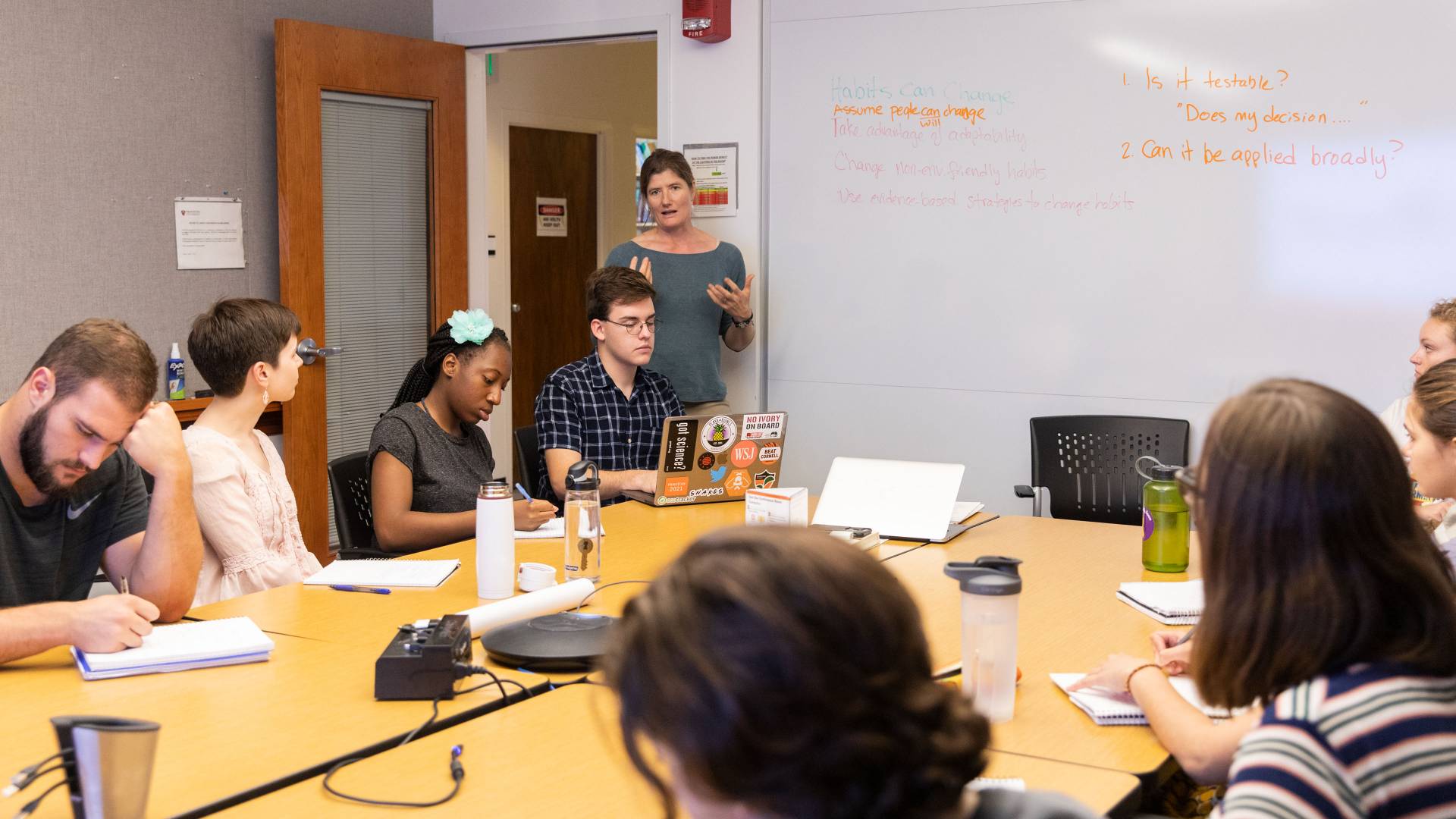Princeton sophomore Ysabel Ayala (right) interviews Fatihah Choudhury at Oasis, a nonprofit dedicated to improving the lives of women and children, in Paterson, New Jersey. Ayala interviewed Choudhury about emigrating from Bangladesh as part of the class “Translation, Migration and Culture,” which is supported by the University’s Program for Community-Engaged Scholarship (ProCES). ProCES bridges service and learning at Princeton, and also manages the curricular component of the new Service Focus program, in which Ayala is participating this year.
“Spanish in the Community.” “Beginning American Sign Language.” “Investigating an Ethos of Sustainability at Princeton.” “Poverty in America.” What do these classes from varied departments have in common? Community engagement is a central component of each.
More than 30 service-oriented courses are offered every semester through Princeton’s Program for Community-Engaged Scholarship (ProCES). The program is part of the Office of the Dean of the College. It connects academics with the University’s signature commitment to service.
ProCES was formerly known as the Community-Based Learning Initiative (CBLI).
“The new name highlights our expanded vision for service in the curriculum that builds on 20 years of CBLI's successful, pioneering work,” said ProCES Director Trisha Thorme.

Christina Seix Academy students Blondie Sajous (left) and Kayla Lindsey (center) talk with Princeton senior Leora Huebner. Princeton computer science students teach coding at the school each week as part of a project organized by ProCES and the Keller Center for Innovation in Engineering Education.
The name change also reflects ProCES’ larger role on campus, and in particular, its role in the new Service Focus program. ProCES manages the curricular component of Service Focus, which bridges service and learning across the first two years of the undergraduate experience. Service Focus students have a summer service internship, take a service-related class designated by ProCES, and reflect on their experiences with peer groups led by faculty mentors.
“ProCES helps students in Service Focus integrate what they saw and learned in their summer internship into a Princeton course and to examine their experiences through an academic lens,” Thorme said.

Princeton junior Daniel Leung (second from left) works with sixth-graders (from left to right) Genesis Sofia Medina, Yanelly DeLeon and Serenity Davis on a coding challenge. The group programmed a small robot to complete an obstacle course. Leung volunteers at Christina Seix Academy in Trenton, New Jersey, as part of the Keller Center’s Engineering Projects in Community Service (EPICS).
ProCES staff collaborate with faculty to incorporate a range of service models into the classroom. They also connect faculty and students with community partners, such as the Historical Society of Princeton, Trenton Area Soup Kitchen and YWCA of Princeton. ProCES recently expanded its reach to offer new partnerships with national and international organizations.
Students can find ProCES classes on the program’s website and the Registrar’s course offerings. Service may be a required or optional part of a ProCES class and can include a range of activities, such as volunteering locally; attending community events and engaging with community members; conducting research for a nonprofit; teaching course material in community settings; or considering service and responses to societal issues in a theoretical way.
For example, community engagement activities this semester included:
- Students in the course “Translation, Migration and Culture” traveled to Oasis in Paterson, New Jersey, to interview women about their migration stories. Oasis is a nonprofit dedicated to improving the lives of women and children.
- Computer science students taught coding at Christina Seix Academy in Trenton, New Jersey. The weekly lessons were organized by ProCES and the Keller Center’s Engineering Projects in Community Service (EPICS). “I feel like the Princeton students have so much experience, but it’s fun because they are closer to our age than our teachers,” said sixth-grader Ameir Barlow.
- Students visited community landmarks during the class “Battle Lab: The Battle of Princeton.” They learned firsthand about the Revolutionary War by excavating artifacts from the Princeton Battlefield site and exploring other historic spots near campus. At the end of the course, students held a public archaeology day at the battlefield to share their findings with visitors.
- Students in the class “Spanish in the Community” volunteered with the Latino Link youth program in Princeton.
- Students studying “Beginning American Sign Language” attended an ASL Poetry Slam in New York City.
ProCES also provides support to juniors and seniors conducting community-engaged research for their independent work.
“Through ProCES courses and experiences, we want students to understand the importance of knowledge and research in creating social change,” Thorme said.

Director of Sustainability Shana Weber (standing at the board) teaches her course “Investigating an Ethos of Sustainability at Princeton.” The class is supported by ProCES, which offers more than 30 service-oriented courses each semester. ProCES was previously known as the Community-Based Learning Initiative. The new name reflects ProCES’ expanded role on campus.






